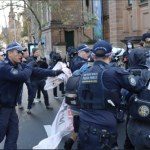Climate Defender’s Mental Health Application Succeeds in Court

Mali Cooper was the courageous Blockade Australia climate defender, who, on 27 June 2022, as part of a broader citywide protest blocked the northern entrance to the Sydney Harbour Tunnel with their car, causing morning peak hour disruption, aiming to alert the wider public to the climate crisis.
Cooper appeared at Lismore Local Court on Tuesday having been charged with disrupting traffic under the Perrottet government’s anti-protest laws, which were specifically passed to silence people demonstrating to raise awareness around escalating extreme weather events.
Magistrate Jeff Linden accepted an application under section 14 of the Mental Health and Cognitive Impairment Forensic Provisions Act 2020 that the climate defender was suffering from a mental health condition after witnessing the destruction of their hometown of Lismore by catastrophic flooding on two occasions in the months leading up to the protest.
“We are very relieved that the court calmly considered all of the facts in this case, including the psychological impact of climate change upon young people like Mali,” lawyer Mark Davis said in a statement, and he stressed that the devastating effect of climate change was the decisive factor.
The magistrate accepted Cooper had diminished responsibility due to the trauma they’d recently suffered. And on being released without conviction, they are now required to undergo treatment with a psychologist for the next six months.
Climate-induced anxiety
The 27 September court decision may have opened up a new line of defence for the rising number of climate activists being prosecuted over their nonviolent direct actions, and increasingly being remanded or sentenced to time in prison in response.
Mali was facing up to 2 years imprisonment and/or a fine of $22,000, which are the maximum penalties that apply to the anti-protest laws passed by NSW parliament in late March to specifically combat rising climate demonstrations.
“It’s the most draconian thing I’ve ever witnessed in NSW parliament,” NSW Greens MLC Abigail Boyd told Sydney Criminal Lawyers in early April, referring to the way the Coalition rushed through the laws. “It now means that we have some of the most severe anti-protest laws in the world,”
While Maritime Workers Union (MUA) Sydney branch secretary Paul Keating explained in July that his organisation and Unions NSW are opposed to the laws and they’re supporting a legal challenge to their legitimacy, after they were rushed through with bipartisan approval.
But the climate anxiety defence could be the argument climate activists have been seeking to counter repressive laws like these, as, while the extraordinary emergency defence has repeatedly failed, this reasoning for having conducted climate-related civil disobedience has succeeded.
Resist through direct action
Following the dropping of their charges, Mali said in a statement that they had watched their community “step up and take care of each other”, as they recalled that both federal and state Liberal Nationals governments had provided a dearth of rescue and relief during the floods.
Mali’s act of defiance was part of a Blockade Australia planned week of action commencing on 27 June, which saw NSW police stakeout a property, raid it twice, arrest protesters for being on the road days after the fact and raid a picnic in a park in Sydney’s inner west.
“It is imperative that this system is confronted and held accountable for the damage that is being dealt,” Mali said on Tuesday after appearing in court. “Extractive industries, colonial violence and a system built for profit are wreaking havoc on our life-support systems.”
“If we stand together and resist through direct action, we have the best chance of turning this destruction around.”







